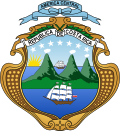Agreements
In 1887, the two countries signed the Convention with the Postal Administration of the Republic of Costa Rica for the exchange of postal parcels, with Detailed Regulations. [5]
In 1907, the two countries signed the Agreement between the United Kingdom and the Republic of Costa Rica for the Exchange of Postal Money Orders. [6]
In 1921, the two countries signed the Exchange of Notes between Great Britain and Costa Rica relative to the Importation from Great Britain into Costa Rica of Opium and similar Drugs. [7]
In 1922, the two countries signed the Convention between Her Majesty's Government and the Government of Costa Rica for the Submission to Arbitration of Certain Claims against the Government of Costa Rica. [8]
In 1928, the two countries signed the Convention between His Majesty's Government in the United Kingdom and the Government of Costa Rica respecting Commercial Travellers. [9]
In 1933, the two countries signed the Exchange of Notes between the Government of the Irish Free State and the Costa Rican Government in regard to Commercial Relations. [10]
In 1950, the two countries signed the Agreement between Canada and Costa Rica. [11]
In 1968, the two countries signed the Exchange of Notes between the Government of the United Kingdom of Great Britain and Northern Ireland and the Government of the Republic of Costa Rica concerning the Abolition of Visas. [12]
In 1975, the two countries signed the Exchange of Notes between the Government of the United Kingdom of Great Britain and Northern Ireland and the Government of the Republic of Costa Rica further amending the United Kingdom / Costa Rica Loan 1973. [13]
This page is based on this
Wikipedia article Text is available under the
CC BY-SA 4.0 license; additional terms may apply.
Images, videos and audio are available under their respective licenses.


